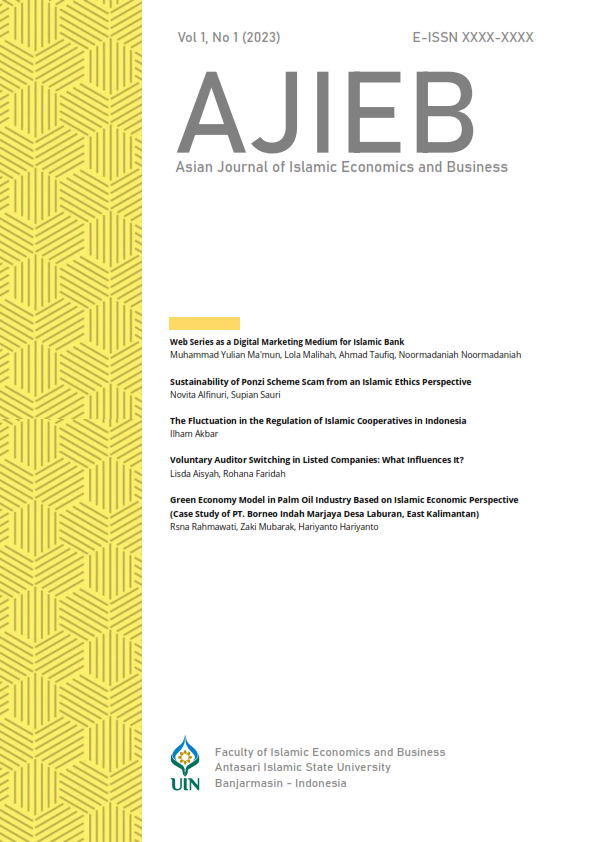Sustainability of Ponzi Scheme Scam from an Islamic Ethics Perspective
DOI:
https://doi.org/10.18592/ajieb.v1i1.9336Keywords:
Ethics, Investment, Islam, Ponzi / Pyramid Scheme, Society WelfareAbstract
Ponzi scheme culture is a form of islamic business ethical violation. This study explains how business using Pyramid Schemes management and fraudulent practices that are not inline with the Al-Quran and As-Sunnah guidance, which in turn lacks sustainability and have pro-longed, destructive impact for the society at a severe scale. The aim of this study is to offer analytical study of a Ponzi Investment Scheme from an Islamic Ethical Perspective. The paper also attempts to offer Islamic principles which occur in implementing ethical business, namely At-Tauhid, Al-Amanah, As-Sidq, Al-Adalah, At-Ta'awun, Al-Maslahah, At-Taradi, and Al-Akhlaq Al-Karimah. It proves that business practice that aim and orientation solely for worldly aspects historically collapse in time. The pursuits of solely by self-interest or the interests of worldly welfare is the doom of society as a result in massive loss from unnecessary human-made crisis. On the opposite, doing business for the welfare of the ukhrawi in the pleasure of Allah SWT, relying on the benchmarks of al-Qur'an and al-Hadith paradigm of ethical values brings great social welfare and is a moral step forward for humanity. This is done by the implementation of the basic Islamic principles that comprehensively govern ethics.References
Kamri, N. A., Ramlan, S., & Ibrahim, A. (2014). Qur'anic Work Ethics. Journal of Usuluddin, 40, 135-172.
Zollman, K. J. (2019). The scientific ponzi scheme.
Azim, M., & Azam, M. S. (2016). Bernard Madoff's' Ponzi scheme': Fraudulent behaviour and the role of auditors. Accountancy Business and the Public interest, 15, 122-137.
Bolotaeva, O. S., Stepanova, A. A., & Alekseeva, S. S. (2019, June). The legal nature of cryptocurrency. In IOP Conference Series: Earth and Environmental Science (Vol. 272, No. 3, p. 032166). IOP Publishing.
Fu, Z., GU, W., Fang, Z., Yan, J., & Liu, X. F. (2022). Pyramid Scheme Prevails in ICO: Evidence from Primary Market Token Transaction Analyses. Available at SSRN 4225546.
Rantala, V. (2019). How do investment ideas spread through social interaction? Evidence from a Ponzi scheme. The Journal of Finance, 74(5), 2349-2389.
W. Keep, W., & J. Vander Nat, P. (2014). Multilevel marketing and pyramid schemes in the United States: An historical analysis. Journal of Historical Research in Marketing, 6(2), 188-210.
W. Keep, W., & J. Vander Nat, P. (2014). Multilevel marketing and pyramid schemes in the United States: An historical analysis. Journal of Historical Research in Marketing, 6(2), 188-210.
Hock, B., & Button, M. (2023). Non-Ideal Victims or Offenders? The Curious Case of Pyramid Scheme Participants. Victims & Offenders, 1-24.
Jain, S., Singla, B., & Shashi, S. (2015). Motivational factors in multilevel marketing business: A confirmatory approach. Management Science Letters, 5(10), 903-914.
Baker, H. K., & Puttonen, V. (2017). Trap 1: Becoming a Victim of Pyramid and Ponzi Schemes. In Investment Traps Exposed (pp. 147-182). Emerald Publishing Limited.
Irina, C. (2018). Cryptocurrencies legal regulation. BRICS law journal, 5(2), 128-153.
Pratiwi, R., Prabowo, M. S., Nugroho, M., & Wardhani, W. N. R. (2022). Fraud Risk in Peer Lending Fintech Transactions: The Role of Consumer Protection Regulation in Indonesia. International Journal of Social Science and Business, 6(4).
Jacques, H. (2022). BALI’S CRYPTO SUMMER ENDS. FINANCE & DEVELOPMENT.
Khadduri, M. (1984). The Islamic conception of justice. JHU Press.
Bebczuk, R. N., & Bebczuk, R. N. (2003). Asymmetric information in financial markets: introduction and applications. Cambridge University Press.
Rafli, M. R., Makiah, Z., Claudia, M., Syahputra, M. D., Aisyah, L., & Faridah, R. (2025). Green Process Innovation and its Impact on Sustainability Performance: The Mediating Role of Green Supply Chain Management in the Food and Beverage Industry. Journal of Entrepreneurship & Business, 6(2), 131-142.
Kamariah, S., Safitri, V. M., & Faridah, R. (2024, September). Inventory Planning and Control Management in an Effort to Increase Warehouse Effectiveness. In Antasari Conference on Islamic Economics and Business (ACIEB).
Khuan, H., Subiyantoro, A., Muhaimin, M., Kalalo, R. R., & Kalempouw, M. (2024). The Effect of Motivation and Compensation on Job Satisfaction with Commitment as a Moderating Variable. Jurnal Ilmiah Edunomika, 8(1).
Asiah, N., & Mubarak, Z. (2024). The Relevance of Gold Investment from the Perspective of Sharia Economic Law (Study of DSN Fatwa Number: 77/DSN-MUI/V/2010). JOURNAL OF ISLAMIC AND LAW STUDIES, 8(2), 281-300.
Alfinuri, N., & Sauri, S. (2023). Sustainability of Ponzi Scheme Scam from an Islamic Ethics Perspective. Asian Journal of Islamic Economics and Business, 1(1), 12-27.
Downloads
Published
How to Cite
Issue
Section
License
Copyright (c) 2023 Novita Alfinuri, Supian Sauri

This work is licensed under a Creative Commons Attribution 4.0 International License.
Authors who publish with this journal agree to the following terms:
- Authors retain copyright and grant the journal right of first publication with the work simultaneously licensed under a Creative Commons Attribution License that allows others to share the work with an acknowledgement of the work's authorship and initial publication in this journal.
- Authors are able to enter into separate, additional contractual arrangements for the non-exclusive distribution of the journal's published version of the work (e.g., post it to an institutional repository or publish it in a book), with an acknowledgement of its initial publication in this journal.
- Authors are permitted and encouraged to post their work online (e.g., in institutional repositories or on their website) prior to and during the submission process, as it can lead to productive exchanges, as well as earlier and greater citation of published work.




